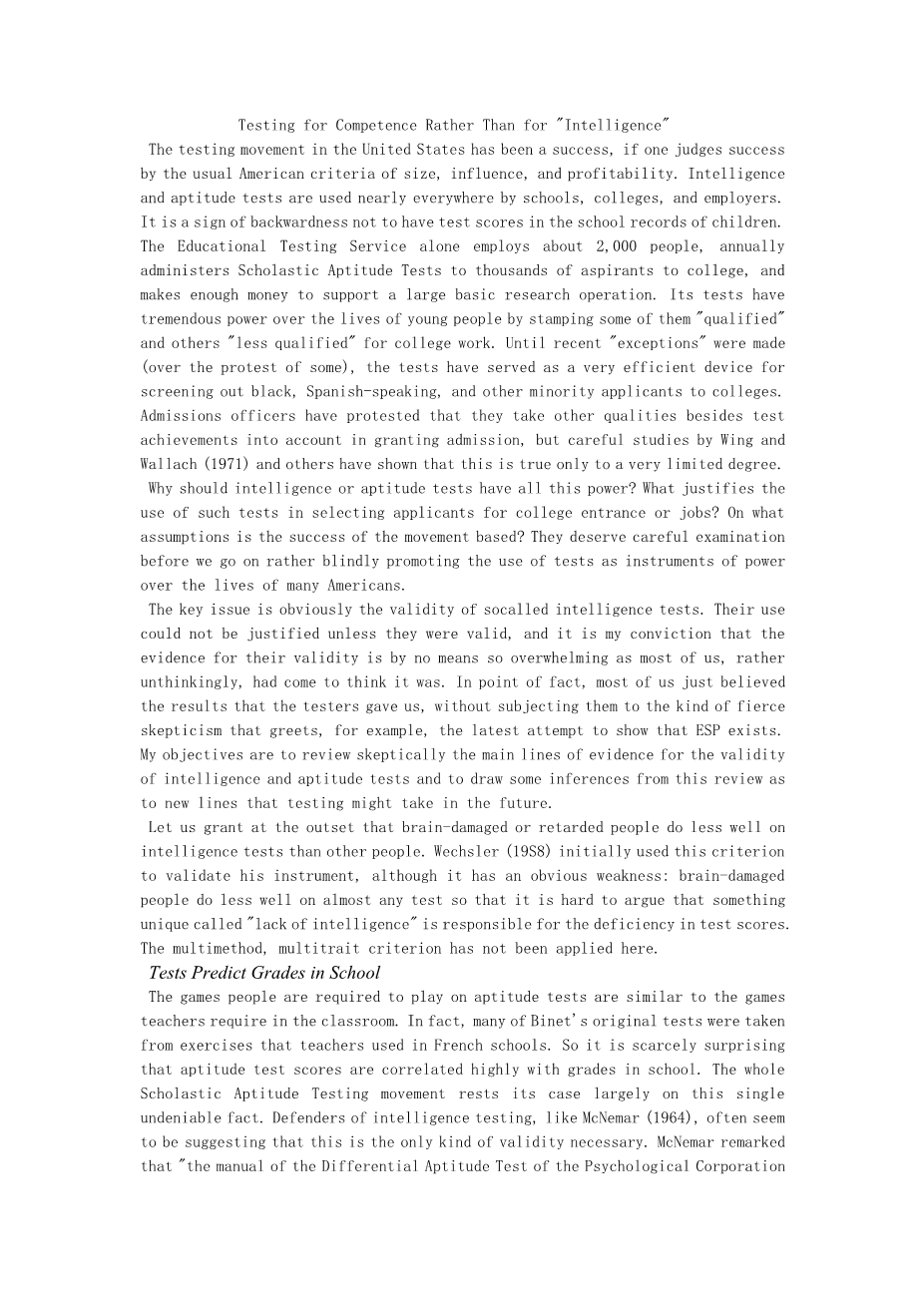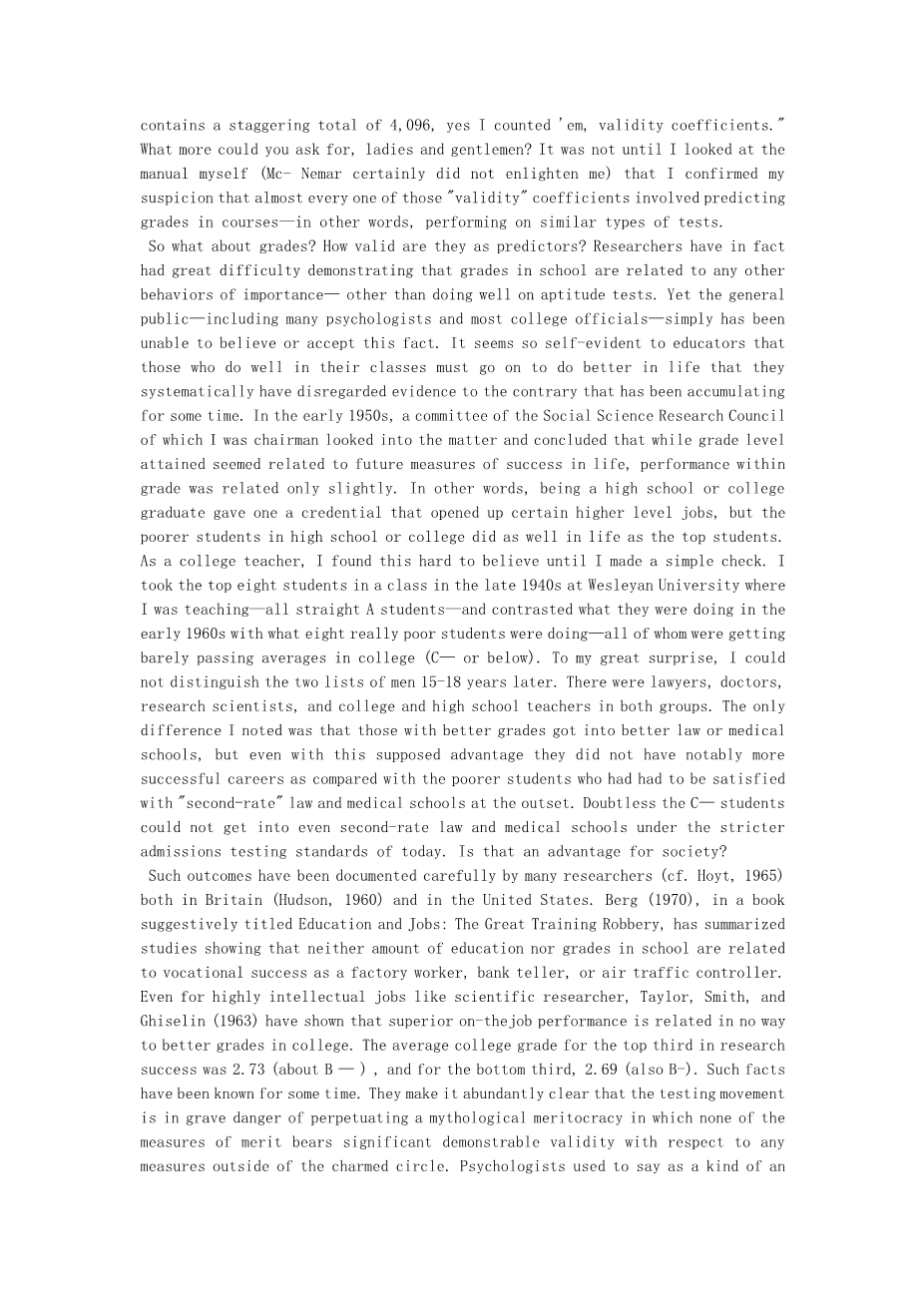公司的技能人员能力评估体系研究外文翻译资料
2022-07-25 13:02:42


英语原文共 18 页,剩余内容已隐藏,支付完成后下载完整资料
Testing for Competence Rather Than for 'Intelligence'
测试能力而不是“智力”
著者 McClelland, D C The American psychologist, 01/1973, 卷 28, 期 1
The testing movement in the United States has been a success, if one judges success by the usual American criteria of size, influence, and profitability. Intelligence and aptitude tests are used nearly everywhere by schools, colleges, and employers. It is a sign of backwardness not to have test scores in the school records of children. The Educational Testing Service alone employs about 2,000 people, annually administers Scholastic Aptitude Tests to thousands of aspirants to college, and makes enough money to support a large basic research operation. Its tests have tremendous power over the lives of young people by stamping some of them 'qualified' and others 'less qualified' for college work. Until recent 'exceptions' were made (over the protest of some), the tests have served as a very efficient device for screening out black, Spanish-speaking, and other minority applicants to colleges. Admissions officers have protested that they take other qualities besides test achievements into account in granting admission, but careful studies by Wing and Wallach (1971) and others have shown that this is true only to a very limited degree.
Why should intelligence or aptitude tests have all this power? What justifies the use of such tests in selecting applicants for college entrance or jobs? On what assumptions is the success of the movement based? They deserve careful examination before we go on rather blindly promoting the use of tests as instruments of power over the lives of many Americans.
如果通过美国通常的规模、影响力和盈利能力标准判断成功,美国的测试运动就已经取得成功。情报和能力测试几乎遍布学校、学院和雇主,但没有在孩子的学校记录中有考试成绩是一个落后的迹象。教育考试服务单位员工约2000人,每年向数以千计的求职者进行学术能力测试,并提供足够的资金支持大型基础研究。其测试对年轻人的生活具有巨大的权力,通过对其中一些“合格”和其他“低资格”进行大学工作。直到最近的“例外”(一些抗议),这些测试已经成为筛选黑人、西班牙语和其他少数民族申请人的高效设备。招生官员抗议认为,除了考入录取之外,还考虑到其他素质,Wing和Wallach(1971)等认真研究表明,这只是在很大程度上是真实的。
为什么智力或能力测试有这样的力量?在选择大学入学申请人或工作岗位时,有什么理由使用这些考试?什么假设是运动成功的基础?在我们盲目推广使用测试作为许多美国人生活的权力手段之前,他们应该仔细检查。
The key issue is obviously the validity of socalled intelligence tests. Their use could not be justified unless they were valid, and it is my conviction that the evidence for their validity is by no means so overwhelming as most of us, rather unthinkingly, had come to think it was. In point of fact, most of us just believed the results that the testers gave us, without subjecting them to the kind of fierce skepticism that greets, for example, the latest attempt to show that ESP exists. My objectives are to review skeptically the main lines of evidence for the validity of intelligence and aptitude tests and to draw some inferences from this review as to new lines that testing might take in the future.
Let us grant at the outset that brain-damaged or retarded people do less well on intelligence tests than other people. Wechsler (19S8) initially used this criterion to validate his instrument, although it has an obvious weakness: brain-damaged people do less well on almost any test so that it is hard to argue that something unique called 'lack of intelligence' is responsible for the deficiency in test scores. The multimethod, multitrait criterion has not been applied here.
关键问题显然是所谓的智力测试的有效性。除非它们是有效的,否则他们的使用是不合理的,而且我相信,证据的有效性并不是绝对压倒性的,相反,我们大多数人认为是这样的。事实上,我们大多数人只是相信测试人员给我们的结果,而不会让他们遇到这样的激烈的怀疑,例如最新的尝试显示ESP存在。我的目标是怀疑地审查智力和能力测试的有效性的主要证据线,并从本次审查中得出一些推论,说明将来可能需要测试的新线。
让我们首先给予脑损伤或迟发的人在智力测试上做得比别人好。 Wechsler(19S8)最初使用这个标准来验证他的仪器,虽然它有一个明显的弱点:脑损伤的人在几乎任何测试中都不那么好,所以很难说出一个叫做“缺乏智慧”的独特之处,考试成绩不足多方法多重判据尚未得到应用。
Tests Predict Grades in School
The games people are required to play on aptitude tests are similar to the games teachers require in the classroom. In fact, many of Binet#39;s original tests were taken from exercises that teachers used in French schools. So it is scarcely surprising that aptitude test scores are correlated highly with grades in school. The whole Scholastic Aptitude Testing movement rests its case largely on this single undeniable fact. Defenders of intelligence testing, like McNemar (1964), often seem to be suggesting that this is the only kind of validity necessary. McNemar remarked that 'the manual of the Differential Aptitude Test of the Psychological Corporation contains a staggering total of 4,096, yes I counted #39;em, validity coefficients.' What more could you ask for, ladies and gentlemen? It was not until I looked at the manual myself (Mc- Nemar certainly did not enlighten me) that I confirmed my suspicion that almost every one of those 'validity' coefficients involved predicting grades in courses—in other words, performing on similar types of tests.
So what about grades? How valid are they as predictors? Researchers have in fact had great difficulty demonstrating that grades in school are related to any other behaviors of importance— other than doing well on aptitude tests. Yet the general public—including many psychologists and most college officials—simply has been unable to believe or accept this fact. It seems so self-evident to educators that those who do well in their classes must go on to do better in life that they systematically have disregarded evidence to the contrary that has been accumulating for some time. In the early 1950s, a committee of the Social Science Research Council of which I was chairman looked into the matter and concluded that while grade level attained seemed related to future measures of success in life, performance within grade was related only slightly. In other words, being a high school or college graduate gave one a credential that opened up certain higher level jobs, but the poorer students in high school or college did as well in life as the top students. As a college teacher, I found this hard to believe until I made a simple check. I took the top eight students in a class in the late 1940s at Wesleyan University w
全文共78886字,剩余内容已隐藏,支付完成后下载完整资料
资料编号:[145081],资料为PDF文档或Word文档,PDF文档可免费转换为Word




